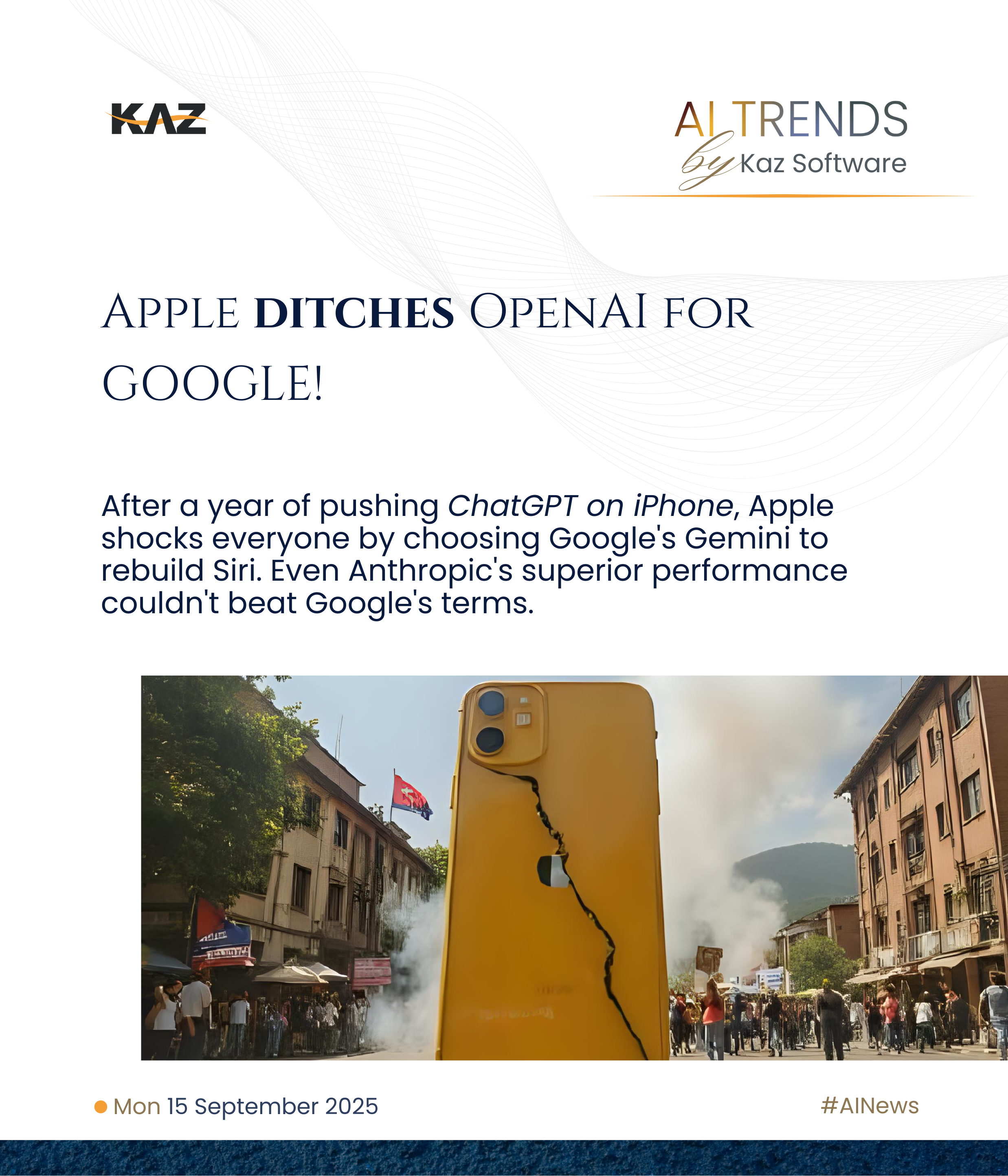Apple finally makes its AI move with Google partnership
/Apple partners with Google to completely rebuild Siri using Gemini AI, sidelining OpenAI despite their ChatGPT partnership last year. The new Siri launches this spring.
Apple partners with Google's Gemini to rebuild Siri from scratch, while OpenAI raises $10B at $500B valuation and xAI faces executive exodus after just months.
Apple's long-awaited AI strategy is finally taking shape, and it's not what anyone expected. After months of speculation about acquisitions and partnerships, the Cupertino giant has chosen Google as its AI partner, sidelining both OpenAI and Anthropic in a move that could reshape the entire AI landscape.
Why Apple chose Google over OpenAI
Bloomberg's Mark Gurman reports that Apple has reached a formal agreement with Google to evaluate and test Gemini models for powering a completely rebuilt Siri. The project, internally known as "World Knowledge Answers," aims to replicate the performance of Google's AI overviews or Perplexity's search capabilities.
The new Siri is split into three components: a planner, a search system, and a summarizer. Sources indicate Apple is leaning toward using a custom-built version of Google's Gemini model as the summarizer, with potential use across all three components. This means we could see a version of Siri built entirely on Google's technology within six months.
What makes this fascinating is who's not in the room. Anthropic's Claude actually outperformed Google in Apple's internal bakeoff, but Anthropic demanded more than $1.5 billion annually for their model. Google offered much more favorable terms. More surprisingly, OpenAI is completely absent from these conversations, despite ChatGPT being the first third-party AI app Apple promoted on iPhone just a year ago.
Craig Federighi, Apple's head of software engineering, told an all-hands meeting: "The work we've done on this end-to-end revamp of Siri has given us the results we've needed. This has put us in a position to not just deliver what we announced, but to deliver a much bigger upgrade than we envisioned." The new Siri will tap into personal data and on-screen content to fulfill queries, finally delivering on the original "Apple Intelligence" vision. It will also function as a computer-use agent, navigating Apple devices through voice instructions. The feature is expected by spring as part of a long-overdue Siri overhaul.
The $500 billion OpenAI phenomenon
While Apple negotiates partnerships, OpenAI continues its meteoric rise. The company has boosted its secondary share sale to $10 billion, up from the $6 billion reported last month. This round tests OpenAI at a staggering $500 billion valuation, up from $300 billion at the start of the year.
Since January, OpenAI has doubled its revenue and user base, making the massive markup somewhat justifiable despite eye-popping numbers. Current and former employees who've held shares for more than two years have until month's end to access liquidity, with the round expected to close in October.
The demand for AI startup investments continues to vastly outstrip supply. Mistral is finalizing a €2 billion investment valuing the company at roughly $14 billion, up from initial reports of seeking $1 billion at a $10 billion valuation. This doubles their valuation from $5.8 billion last June and represents their first significant war chest—doubling their total fundraising in one round.
Executive exodus hits xAI
Not all AI companies are riding high. xAI's CFO Mike Liberator left after just three months, departing around July after starting in April. He had overseen xAI's debt and equity raise in June, which brought in $10 billion with SpaceX contributing almost half the equity—suggesting comparatively sparse outside investor demand.
This follows a pattern of departures. General counsel Robert Keel left after a year, citing in his farewell that "there's daylight between our worldviews" regarding Elon Musk. Senior lawyer Rahu Rao departed around the same time, and co-founder Igor Babushkin announced his exit on August 13th to start his own venture firm. X CEO Linda Yaccarino also announced her departure in July after the social media platform's merger with xAI.
Data labeling wars escalate
The competition has turned litigious in the data labeling sector. Scale has sued rival Mercor for corporate espionage, claiming former head of engagement Eugene Ling downloaded over 100 customer strategy documents while communicating with Mercor's CEO about business strategy.
The lawsuit alleges Ling was hired to build relationships with one of Scale's largest customers using these documents. Mercor co-founder Surya Midha responded that they have "no interest in Scale's trade secrets" and offered to have Ling destroy the files.
The situation is complicated by Meta's acquihire deal with Scale, which caused multiple major clients to leave. Meta themselves have moved away from Scale's data labeling services, adding rival providers including Mercor. For anyone looking for signs that AI is slowing down—whether in competition, talent wars, or fundraising—the answer is definitively no. Apple's partnership with Google signals the start of a new phase in AI competition, where even the most independent tech giants must choose sides. OpenAI's $500 billion valuation proves investor appetite remains insatiable. And the escalating conflicts between companies show an industry moving faster, not slower, toward an uncertain but transformative future.





